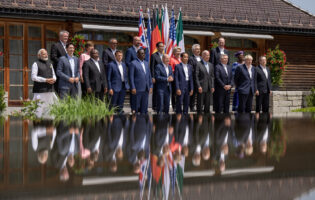German Foreign Policy After the Lisbon Treaty
On May 24, 2010, the American-German Institute (AGI) hosted a conference on “German and European Policy after the Lisbon Treaty.” The conference featured expert speakers from the political, non-profit, and academic fields in Germany and the United States and was generously supported by a grant from The German Marshall Fund of the United States. Over the course of four panels, the speakers and participants discussed the implications of the Lisbon Treaty, relations between the EU and NATO, energy policy, and European enlargement and Europe’s borders.
The first panel examined the implications of the Lisbon Treaty, answering questions such as whether the European Union will be a more important player internationally and how the Treaty will affect German foreign policy. The EU is a project of recovery and peace but is now facing problems of overstretch, renationalization, and demography. The Lisbon Treaty attempts to address these issues by making the EU a subject of international law, making the European Parliament stronger, and instituting a previously successful president. It also reduces the number of commissioners, implements majority voting, and creates a European foreign minister and diplomatic corps, the European External Action Service (EEAS). On the issue of renationalization, the Treaty should help the EU to step in and use economic measures in member states where economic decline has led to far-right electoral success (as in the Czech Republic and Hungary). This will be a challenge, as the Greece crisis has caused doubts about the EU, even in Germany, which has greatly benefitted from European integration. Leaders need to remind their publics that the EU is a necessary organization for the future. Likewise, leaders need to promote immigration to address the problems of declining and aging societies. That European societies are not inclusive of immigrants, especially Muslim immigrants, is a problem with particular security ramifications: Every terrorist attack in Europe has been home-grown.
Consensus across the Atlantic is lacking on these issues of overstretch, renationalization, and demography. For the United States, it is unclear with whom they should be developing consensus – individual countries or the EU. Furthermore, it is unclear which Europe the U.S. is dealing with: NATO, member states, the EU-3 (Germany, Great Britain, France), or the EU. Indeed, the U.S.-EU Summit agenda is broad, and includes areas of consensus (security, nonproliferation) and concern (is the European economy capable of weathering the Greece crisis). Still, the U.S. is optimistic that the Lisbon Treaty will ease communication between the two partners, although the Treaty itself will have a minimal influence on substance in transatlantic relations. The hope is that the Lisbon Treaty will lead to a more effective, unified partner better able to handle crises. For example, the EU’s handling of the Georgia crisis in August 2008 could have been far different had the six-month rotating presidency been held by a country other than France. It is this inconsistency in leadership that the U.S. hopes the Lisbon Treaty will mitigate.
The second panel turned to the question of relations between the EU and NATO, discussing how cooperation between the EU and NATO can be improved and what lessons can be drawn from the EU’s mission in the Balkans. The purpose of a European defense policy is to act where NATO as a whole is not engaged. As such, the EU needs to be able to take its own action both militarily and politically, despite the challenges of integrating political goals. Furthermore, the EU does not have the full spectrum of tools as does NATO; thus, the two organizations are separable but not separate. Cooperation on the ground between NATO and the EU, as in the Balkans, is better than in theory, and the Balkans can serve as a model for policing, rule of law, and civil society initiatives, which the U.S. would like to see applied more effectively in Afghanistan. From the U.S.’ perspective, the Obama administration does not hold any reservations about a strong European defense ability or about the EU as an international security actor, but it does question whether Europe can and will deliver, given the distractions of the Greece crisis. The U.S. is content to have the EU lead on larger missions, as in combating piracy off the Horn of Africa.
The luncheon discussion focused on energy policy, and more specifically, on Germany’s role in developing green technologies and using its relationship with Russia to solve Europe’s energy dependency problem. Russia has a mutual dependency with Germany and the EU in terms of oil and gas exports. The U.S., too, is involved in the discussion with its concerns about securing the Nabucco pipeline. In order to solve questions of energy resources, dependence, and security, the EU and U.S. have developed an Energy Council, a high-level joint imitative, and three working groups; their approach is to look for best practices and come up with action plans.
The conference concluded with a panel on enlargement and the European border, asking whether the enlargement process is complete and if Germany is fulfilling its role as a bridge between eastern and western Europe. The younger generation in Germany is generally positive about the enlarged EU and euro zone and does not see a need to restrict either. Enlargement has been decisive in European integration, both institutionally and emotionally (cultivating a feeling of European-ness); further, economic competition is good for the EU. Some German leaders do indeed see enlargement as incomplete, with the EU integrating Switzerland, Norway, and even Turkey. For some, the pros of Turkish membership (energy, security, a bridge to the Islamic world, human rights, economics, and demographic changes) outweigh the cons. It is true that EU member states have geographical preferences in developing partnerships – Italy and the Mediterranean states, Germany and eastern Europe, the UK and the United States. The U.S. is more interested in the EU’s southern periphery and southern member states; in particular, how Germany and others work to contain the Greek economic crisis. This goes to show how the agenda can change and if U.S. interests shift (i.e., away from the Maghreb, Caucuses, or Balkans), then the EU needs to step in.
Europe should decide whether it wants to follow countries and borders or markets and opportunities. Issues in the extended neighborhood impact and limit neighborhood activities within the EU; for example, relations with Russia influence what neighborhood politics the EU can enact with Ukraine. At the EU level, the Lisbon Treaty separated neighborhood and enlargement policies, echoing enlargement fatigue within the Union. Finally, Europe’s relevance is not in Europe but is in what the EU is doing beyond its borders.







